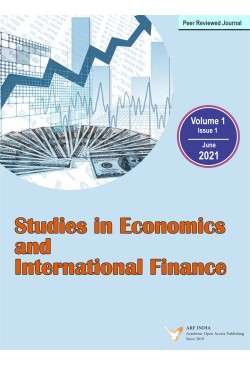
Studies in Economics and International Finance
Frequency :Bi-Annual
ISSN :2583-1526
Peer Reviewed Journal
STRATEGIC SUPPLY IN IMPERFECT MARKETS
JEL Classification: D43, E12, E32
T.V.S. Ramamohan Rao (2023). Strategic Supply in Imperfect Markets. Studies in Economics & International Finance, Vol. 3, No. 1, pp. 1-10. https://DOI: 10.47509/SEIF.2023.v03i01.01
BUDGET DEFICITS AND THE CHOICE OF EXCHANGE RATE REGIME: THE CASE OF ECOWAS COUNTRIES
EXAMINING THE INFLUENCE OF INFLATION, UNEMPLOYMENT, POVERTY, AND POPULATION GROWTH ON ECONOMIC DEVELOPMENT IN INDIA
ECONOMIC GROWTH – INFLATION NEXUS: THE OPTIMAL INFLATION ARGUMENT FOR GHANA
IMPACT OF GOVERNMENT EXPENDITURE, UNEMPLOYMENT, INFLATION, AND HOUSEHOLDS CONSUMPTION ON ECONOMIC GROWTH IN INDIA
The impact of government expenditure, unemployment, inflation, and household consumption on the economic growth of India over the period 1990-2021 has been examined in this paper. The ordinary least squares (OLS) regression analysis was performed by observing the assumptions of the classical linear model. Augmented DickeyFuller (ADF) and PhilipsPerron (PP) tests were carried out for the stationarity of the concerned variables. The study found that increasing government expenditure has a strong positive influence on the growth of national income and consumption and a negative influence on unemployment in India. The study recommends increasing government expenditure that could accelerate economic growth and create employment opportunities that also have a positive impact on improving consumption. Results indicate that inflation significantly depresses economic performance in India because of uncertainty and reduces investment, employment, and consequently output and consumption level. Unemployment has not significantly impacted the real GDP in India. Investment in physical capital and human capital has significantly promoted economic performance in India because investment in human capital improves the productivity of the labor forces and hence increases output and investment in physical capital increases the amount of capital per unit of labor and these have the potency of increasing productivity per worker. The overall effect is an increase in output and therefore economic performance. The study recommends increasing government expenditure as it boosts aggregate demand which could accelerate economic growth and create employment opportunities and enhance the consumption level of the public.
Jitendra Kumar Sinha (2023). Impact of Government Expenditure, Unemployment, Inflation, and Households Consumption on Economic Growth in India. Studies in Economics & International Finance, Vol. 3, No. 1, pp. 63-76.https://DOI: 10.47509/SEIF.2023.v03i01.05
EFFECT OF EXCHANGE RATE ON FOREIGN RESERVES IN NIGERIA: AN ARDL APPROACH
INTERNAL CONTROL SYSTEM AND FINANCIAL PERFORMANCE OF SMALL AND MEDIUM SCALE ENTERPRISES IN NIGERIA